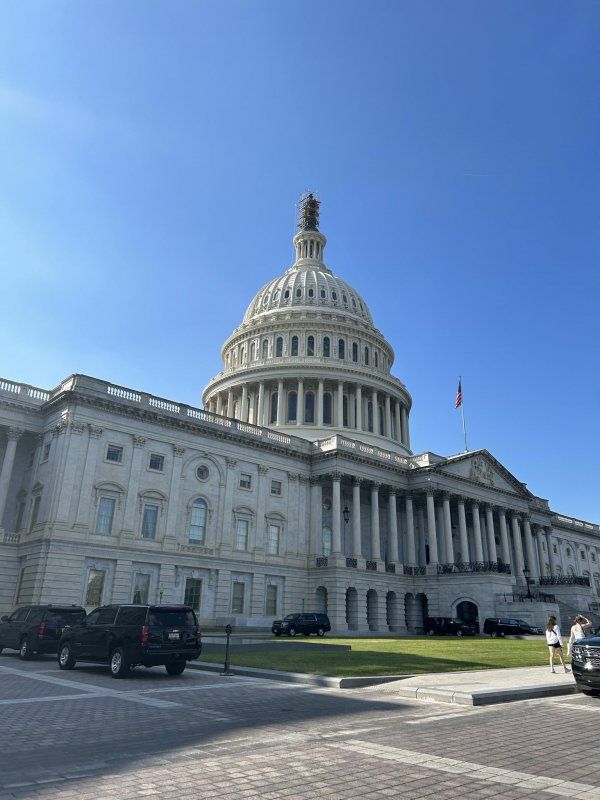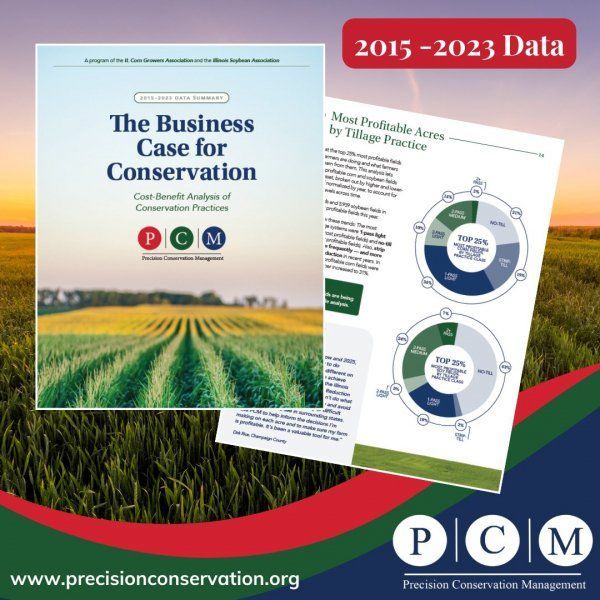Featured Article

June 27, 2024
June is Dairy month so IL Corn touched base with some dairy farmers in Illinois. Here’s what they shared. 1. It’s a day in-day out job Dairy Farming is a commitment unlike most 9-5 jobs. Matt, a local dairy farmer from Kilgus Farmstead located in Fairbury, IL, talks about the needs of dairy cattle on a day-to-day basis. “We milk twice a day every day, some farmers do three times a day just depending on preference or demand of the cattle,” he told us as he explained that most people do not realize the constant 24-hour effort it takes when you are living at the beck and call of livestock. 2. Most Dairy Farms in IL are Family owned A common misconception in the agriculture industry is that most farms are corporately owned whereas the reality is that a lot of farms, especially dairy farms, are family owned, passed down from generation to generation. They’re comprised of fathers and sons working alongside uncles and cousins to produce the needs for our world to operate. Nowadays, most farms are onto their 2nd, 3rd, and even 4th generation of farmers. As the world continues to evolve so does the need for agriculture with it. Families work together and dedicate their time to care for their livestock to produce the best product for their consumers. 3. Test before committing type of career With most farms in Illinois being family owned, it can be a tricky business to get involved in. The easiest way to get involved is to find yourself as a hand, which would likely lead to being a manager of a farm. In today’s economy, it’s “near impossible” to fund the start-up of a dairy cattle farm. Starting as hand is the best way to test your toe in the water before jumping in, as this type of laboring career isn’t for everyone. 4. Safety of Cattle Along with the misconception of farms being corporately owned, there’s a large misunderstanding as to the treatment of livestock. Dairy farmers take pride and great care in the comfort of their cattle, making it their highest priority. Philip, a 4th generation dairy farmer in the area, explained, “a lot of people don’t understand how we care for our cattle. We want them properly taken care of, healthy, and comfortable.” A healthy cow produces the best milk.

June 20, 2024
From the outside, IL Corn may sound like an echo chamber when it comes to the Next Generation Fuels Act. From countless interviews, Congressional visits, presentations at the Farm Progress show and other avenues of communication the message is clear. Corn farmers need the Next Generation Fuels Act passed- and they need it to happen soon. But why? Why are Illinois corn farmers worried about an energy bill bound to be caught up in the plentiful political dynamics present in today’s Congress? Emphasis and urgency have been placed on the legislation because farmers, rural communities, and the public will suffer if the bill, or similar legislation is not passed.

June 19, 2024
The Normal Cornbelters are thrilled to announce Ag Night on June 28th, a celebration that promises to be a-maize-ing for fans of all ages! Packed with tons of games, vendors, and giveaways, this event is sure to be a hit. A special highlight of the night will be the biofuels trailer—a real ear-opener for anyone interested in learning more about renewable energy and agriculture. You won’t want to miss learning about the CornBelter’s namesake, the fact that McLean County, Illinois grows more corn than any other county in the nation. And in case you missed it, we’re talking field corn, used for biofuels, corn plastics, sweeteners and more and not sweet corn that you enjoy as a veggie in late summer. If this is news to your ears, we’ve got even more background on McLean County’s legacy in the biofuels trailer, featured during this event. The biofuels trailer, a 45-foot-long marvel, is dedicated to all things biofuels. Visitors will discover how the fuels are produced in Illinois, their ability to improve our environment by reducing our dependence on foreign oil, and how they positively impact our economy. This mobile education center is stocked full of educational, interactive displays, videos, and more, making it a must-see attraction for the evening. Attendees can look forward to a kernel of fun and learning, diving deep into the world of biofuels and agriculture. Additionally, learn about the heart of Illinois agriculture: its family farms. Did you know that 96% of farms in Illinois are family-owned? This night is a great opportunity to appreciate the hard work and dedication of our local farming families by meeting the Farm Family Friday feature – The Bickelhaupts. Tickets for this fun-filled doubleheader are available now . Don’t miss out on this unique opportunity to combine baseball, education, and agricultural appreciation in one unforgettable night.

June 13, 2024
BLOOMINGTON, Ill. -- Today, the IL Corn Growers Association (ICGA) joined 12 other state corn organizations, and oil industry representatives to sue the Environmental Protection Agency (EPA) for its inequitable and costly electrification of America’s vehicle fleet. The National Corn Growers Association (NCGA), 25 state attorneys generals, the American Petrochemical Institute (API), the American Fuel and Petrochemical Manufactures (AFPM), auto dealerships, and Valero were among the organizations who filed petitions against the agency. “In its multipollutant rule, the EPA incentivized the electric vehicle industry for its ability to reduce carbon but refused to acknowledge the positive impact of renewable fuels,” ICGA President Dave Rylander said. “Ethanol is currently decarbonizing our atmosphere. Why are we penalizing our current solution for a technology that is not obtainable at its proposed level, today?” The oil and agriculture industries request an approach that levels the playing field for all vehicle technologies and fuels to reduce emissions. The EPA’s summary predicts the final rule, released in March, will cost $870 billion in vehicle technology. ICGA’s petition argues the rule’s astronomical price tag requires congressional authorization. The coalition points to ethanol, and other renewable fuels as a cost efficient, practical solution to the Biden Administration’s climate concerns. “Let’s support an ‘all-hands-on deck’ solution to lowering greenhouse gas emissions,” Rylander said. “The American public and our American farmers deserve better than the EPA’s unrealistic rule.” ### About the IL Corn Growers Association IL Corn Growers Association is a state-based organization that represents the interests of corn farmers in Illinois, maintaining a high profile on issues in Washington, DC, and Springfield, IL. Through grassroots advocacy, ICGA creates a future for Illinois farmers in which they can operate freely, responsibly, and successfully. In order to fulfill this mission, the organization conducts governmental affairs activities at all levels, market development projects, and educational and member service programs. For further information regarding their work and involvement, visit their website www.ilcorn.org.

June 13, 2024
Breaking Down the Titles of the Farm Bill In a simple explanation, the farm bill is a package of legislation that governs an assemblage of agriculture and food programs. However, there is nothing simple about the farm bill. While the roots of the farm bill are planted deep in its farm support programs, the bill has expanded to address various issues in an ever-evolving world. From conservation initiatives and bioenergy to rural development and nutrition policy, the farm bill provides funding for programs that impact individuals of different regions and social demographics across the country. The current farm bill is made up of 12 titles: Title I: Commodities — Provides support for major commodity crops, including wheat, corn, soybeans, peanuts, rice, dairy, and sugar. Reauthorizes marketing loan and disaster programs. Title I includes funding for the Agriculture Risk Coverage (ARC) and Price Loss Coverage (PLC) programs. Title II: Conservation — Encourages environmental stewardship of farmland and refined land management through land retirement programs and/ or working lands programs. Addresses environmental and natural resource concerns [HB2] . Title II includes funding for the Conservation Reserve Program (CRP) and the Environmental Quality Incentive Program (EQIP). Title III: Trade — Supports the U.S. agricultural export programs as well as various international food assistance programs. Title III includes funding for the Foreign Market Development (FMD) and Market Access Development Programs (MAP). Title IV: Nutrition — Provides nutrition assistance for low-income households through programs, including the Supplemental Nutrition Assistance Program (SNAP). Title V: Credit — Provides lending opportunities that private commercial entities cannot offer, consisting of direct government loans for producers to buy land and operate farms and ranches. Title VI: Rural Development — Provides funding to programs to build competitive advantages in rural communities. Supports rural housing, business, community facilities, and utility programs through grants, loans, and guarantees. Title VII: Research, Extension, and Related Matters — Supports agriculture extension and research programs to develop academic knowledge and assist producers in becoming more productive. Title VII includes funding for programs such as the Beginning Farmer and Rancher Development Program and the Agriculture and Food Research Initiative. Title VIII: Forestry — Provides authority for the U.S. Forest service and supports forestry management programs. Title IX: Energy — Encourages the expansion of community and farm renewable energy systems through different programs, including various loan guarantees and grants. Title X: Horticulture — Supports the production of specialty crops, certified organic foods, and certified local foods. Authorizes a regulatory framework for industrial hemp. Title X includes funding for the National Organic Program and Specialty Crop Block Grants. Title XI: Crop Insurance — Enhances risk management through the permanently authorized Federal Crop Insurance Program. Helps protect producers from losses resulting from yield and price risks. Title XI includes funding for disaster assistance programs (also under Title I) as well as Emergency Farm Loans and Whole Farm Revenue Protection. Title XII: Miscellaneous — Includes various programs and assistance for livestock and poultry production and provides support for beginning farmers and ranchers. Includes supports for agriculture and food defense, limited-resource producers, historically underserved producers, and other miscellaneous provisions. Barring complications, the farm bill is typically renewed every five years, reauthorizing programs that would otherwise expire and extending funding for the bill’s permanent programs. The current farm bill is called the Agriculture Improvement Act of 2018 and was enacted into law in December of 2018. This bill has been extended through September 30, 2024, and Congress is currently drafting and debating the next farm bill.

June 12, 2024
Dad, Grandad, Papa, Pop—whatever you call your father on the farm, they deserve a day of appreciation. Farm fathers embody the hard work, resilience, and traditions that are the backbone of Illinois' farming communities. We’ve put together a short list of gifts that show appreciation to your dad while also supporting farming and corn! 1.Corn Tennis shoes Whether it’s a family hike, working out, walking around the farm, or even just for a casual outfit, everyone needs a nice pair of tennis shoes. Saucony produces an innovated and improved type of running shoe where the cushion is made from 55% corn to prevent plastic dependency. Comfortable, casual, stylish, and sustainable. 2. Family movie marathon, with homemade popcorn Does your dad love to binge watch movies? Let him pick his favorite movie series and have a family movie night. No movie night is complete without popcorn. Make a few different bowls of popcorn and add a variety of toppings such as cheese, salt, chocolate, or even caramel. The options are endless. 3. Corn Based Whiskey Brand How about a nice glass of whiskey on the rocks for Father’s Day? Take a tour of a local distillery to learn all about the process of producing whiskey, and also enjoy some of the product as well. 4. Locally raised pork What better way to celebrate everyone’s favorite guy than with a BBQ cookout? There’s nothing that says “I love you, Dad” like some BBQ ribs or pulled pork. Shop locally raised pork to find the perfect piece. 5. Locally raised beef Maybe instead of a BBQ your dad would prefer a perfectly grilled ribeye steak. Shop some locally raised beef to get your dad the best cut for this father’s day. 6. Ingeo(corn based fibers) fabric bedding Ingeo is a corn-based fabric. Focused on sustainability, it’s being used in the production of bedding, sheets, clothes, etc. This fabric provides a new sustainable way to produce everyday materials, and it’s extremely soft!

June 12, 2024
Precision Conservation Management (PCM) – the premier conservation program of the IL Corn Growers Association and Illinois Soybean Association – will be publishing their annual data book The Business Case for Conservation in the June issue of Prairie Farmer Magazine. This report highlights data gleaned from farmers in Illinois regarding the financial, agronomic, and environmental impact of in-field conservation practices. Takeaways include: Higher yields do not always equal higher profitability. More than two passes of heavy tillage is never profitable compared to lighter tillage systems. Strip tillage is also proving to be a profitable option. The past 9 years of data have shown that nitrogen applications over MRTN rates are less profitable. Cover crops are the most effective tool for improving water quality and soil health, although profitability remains a challenge. Several cost-share opportunities are available to farmers through PCM and other programs. NEW: While their annual data book focuses on high SPR soil data, PCM has also published low SPR data on their website . Want to understand the book better? PCM Launches Webinar Series 2024 Precision Conservation Management (PCM) Webinar Series Explaining Data in Book Discover the latest insights from Precision Conservation Management (PCM) in our three-part webinar series. Join us as we dive into the newest data-driven findings on optimizing conservation practices for both profitability and sustainability. Throughout the series, experts from PCM, the IL Corn Growers Association, and the University of Illinois farmdoc team will share valuable insights to help farmers make informed decisions. Don't miss this opportunity to learn how PCM's cutting-edge research can help you balance profitability and sustainability on your farm. June 20: Cost-Benefit Analysis of Conservation Practices New Data from PCM with Focus on Cover Crops and Tillage. Precision Conservation Management (PCM) works directly with farmers and uses data analysis to determine how farmers can implement conservation practices without sacrificing profits. This webinar from Greg Goodwin (IL Corn Growers Association) and Gary Schnitkey (University of Illinois farmdoc team) covers 9 years of data-driven insights. We will emphasize profitable practices using cover crops. Profitability and tillage practices will be examined. August 1: Balancing Profitability and Sustainability: PCM's Latest Insights Here we will take a deeper dive into nitrogen management relations to profitability and the environment. We will also look at the potential and issues associated with carbon markets. September 5: Maximizing Returns on Challenging Soils: PCM's Low SPR Findings We will look at environmental indicators from PCM farms and their relationship to farming practices. NEW this year: PCM has separate data available for high SPR and low SPR soils so you can better assess how conservation practices could impact your fields.

June 6, 2024
It’s summertime in the nation’s capital, and members of Congress appear to be solar-powered. After a long impasse, there has finally been some movement to reauthorize the farm bill. The House Committee on Agriculture recently passed the Farm, Food, and National Security Act by a vote of 33-21. Getting to this point has been a long haul. Corn grower leaders testified in front of the House and Senate Agriculture Committees throughout 2022 and 2023, sharing the National Corn Growers Association’s position on the legislation. Grower advocates also took part in roundtables and listening sessions across the country. While the farm bill was initially due for reauthorization last year, it has already been extended once as Congress debated and voted on government funding bills and sorted through House leadership issues. But now, thanks to the hard work of House Agriculture Committee Chairman G.T. Thompson (R-Penn.), as well as committee members from both parties, we have moved into a different stage in the legislative process, though there is still much work to be done. With the release of bill text, we are pleased to confirm that many of our recommendations are reflected in the legislation that passed the House Agriculture Committee. Our lobbying and messaging efforts have focused on making sure that the bill will protect federal crop insurance, bolster U.S. international market development efforts, strengthen the producer safety net and support voluntary conservation programs. During the Committee markup, we were supportive of several amendments that were filed to improve the farm bill. For example, Rep. Max Miller (R-Ohio) offered an amendment on sustainable aviation fuel that was adopted by the committee. And Rep. Dusty Johnson (R-S.D.) offered an amendment requiring a mandatory base acre update that would better reflect corn growers' priorities for commodity program eligibility. Unfortunately, the House Ag Committee bill is not expected to make it to the House floor for a vote until at least September. In the meantime, we expect for Sen. John Boozman (R-Ark.), the ranking member on the Senate Agriculture Committee, to soon lay out a Senate Republican framework for the farm bill to spur bipartisan negotiations with Senate Agriculture Committee Chairwoman Debbie Stabenow (D-Mich). For the farm bill to be successfully reauthorized this year, there will ultimately need to be broad support from members of both parties in the House and Senate. To that end, corn grower leaders will spend the next several months not only advocating for our priorities but also for final legislative language that will garner more bipartisan support for the legislation. Our work continues, and we will need your help every step of the way. To that end, if you haven’t already, I would encourage you to sign up for our advocacy updates by texting COB to 52886. We will also be sending news updates on the farm bill. You can sign up for these and other news items at the bottom of the NCGA website . Maybe it’s the sunny weather that is affecting my outlook. But I am feeling good about corn’s position to secure many of our priorities throughout this process. But I understand we still have a ways to go to reauthorize this legislation, which is so vital to farmers and rural America. Here’s to summer. Here’s to getting the farm bill across the finish line! Appleton is vice president of public policy at the National Corn Growers Association.
Articles
2026
2025
2024
2023
2022
2021
2020

